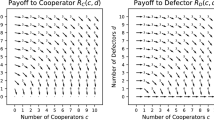Abstract
We present a model that demonstrates the evolution of groups composed of cooperative individuals performing specialised functions. Specialisation and cooperation results from an evolutionary process in which selection and reproduction is based on individual fitness. Specialists come to help (through the donation of resources) their non-kin group members, optimising their behaviour as a team and producing a fitter group. The mechanism that promotes this benevolent, cooperative group behaviour is based on the concept of a “tag”. Tags1 are observable markings, cues or displays. Individuals can observe the tags of others and take alternative actions based on those observations (e.g. to altruistically2 help or not). We show that even random (or dumb) searching for appropriate partners produces significant levels of specialisation and cooperation. Additionally we demonstrate that non-random (or smart) searching dramatically increases the effect.
The concept of “tags” in the context of structuring social interactions among agents was first outlined by Holland [6] and applied to repeated interactions by Riolo [7].
By altruism, we mean that agents sacrifice fitness for others even though such donations may not be returned (i.e. without reciprocity).
In these previous models when identical agents are paired they must act altruistically.
Access this chapter
Tax calculation will be finalised at checkout
Purchases are for personal use only
Preview
Unable to display preview. Download preview PDF.
Similar content being viewed by others
References
Hales, D.: Cooperation without Space or Memory: Tags, Groups and the Prisoner’s Dilemma. In Moss, S., Davidsson, P. (Eds.) Multi-Agent-Based Simulation. Lecture Notes in Artificial Intelligence 1979. Berlin: Springer-Verlag (2000)
Hales, D.:Tag Based Cooperation in Artificial Societies. Unpublished Ph.D. Thesis, Department of Computer Science, University of Essex (2001)
Hales, D.: Cooperation and Specialisation without Kin Selection using Tags. CPM Working Paper 02-88. The Centre for Policy Modelling, Manchester Metropolitan University, Manchester, UK (2002a).
Hales, D.: Smart Agents Don’t Need Kin — Evolving Specialisation and Cooperation with Tags. CPM Working Paper 02-89. The Centre for Policy Modelling, Manchester Metropolitan University, Manchester, UK (available at: http://www.cpm.mmu.ac.uk/cpmreps.html), (2002b).
Hales, D.: Wise-Up!-Smart Tag Pairing Evolves and Persists. CPM Working Paper 02-90. The Centre for Policy Modelling, Manchester Metropolitan University, Manchester, UK (available at: http://www.cpm.mmu.ac.uk/cpmreps.html), (2002c).
Holland, J.: The Effect of Labels (Tags) on Social Interactions. SFI Working Paper 93-10-064. Santa Fe Institute, Santa Fe, NM, (1993)
Riolo, R.:The Effects of Tag-Mediated Selection of Partners in Evolving Populations Playing the Interated Prisoner’s Dilemma. SFI Working Paper 97-02-16. Santa Fe Institute, Santa Fe, NM. (1997).
Riolo, R., Cohen, M. & Axelrod, R.: Cooperation without Reciprocity. Nature 414, 441–443. (2001).
Pedone, R. & Parisi, D.:In What Kinds of Social Groups can Altruistic Behaviour Evolve? In Conte, R., Hegselmann, R. and Terna, P., Eds., Simulating Social Phenomena — LNEMS 456, Springer-Verlag, Berlin.(1997).
Sigmund & Nowak: Tides of tolerance. Nature 414, 403–405. (2001).
Watts, J. D.: Small Worlds — The Dynamics of Networks between Order and Randomness. Princeton, New Jersey, USA. (1999).
Author information
Authors and Affiliations
Editor information
Editors and Affiliations
Rights and permissions
Copyright information
© 2003 Springer-Verlag Berlin Heidelberg
About this paper
Cite this paper
Hales, D. (2003). Evolving Specialisation, Altruism, and Group-Level Optimisation Using Tags. In: Simão Sichman, J., Bousquet, F., Davidsson, P. (eds) Multi-Agent-Based Simulation II. MABS 2002. Lecture Notes in Computer Science(), vol 2581. Springer, Berlin, Heidelberg. https://doi.org/10.1007/3-540-36483-8_3
Download citation
DOI: https://doi.org/10.1007/3-540-36483-8_3
Published:
Publisher Name: Springer, Berlin, Heidelberg
Print ISBN: 978-3-540-00607-7
Online ISBN: 978-3-540-36483-2
eBook Packages: Springer Book Archive




